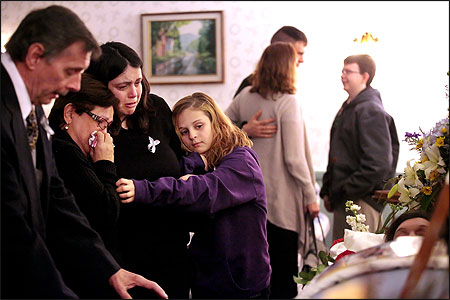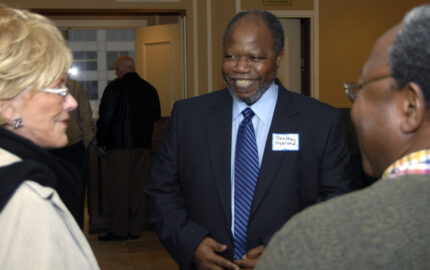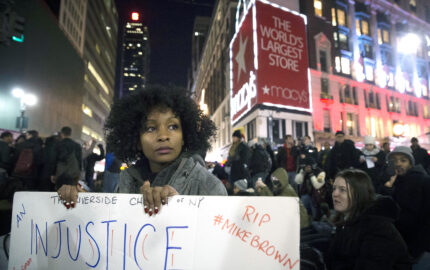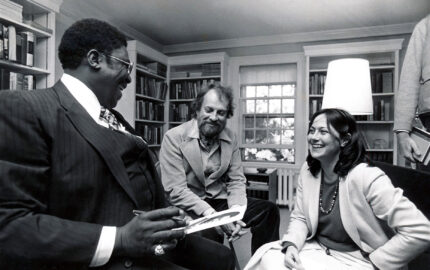
Family and friends gather to mourn a man who was fatally shot by police. His killing was part of a Concord (N.H.) Monitor investigation into police shootings of mentally ill people. Photo by Alexander Cohn/Concord Monitor.
In the first six months of this year, New Hampshire police officers shot four mentally ill people as they suffered suicidal breakdowns. Three died and the fourth lost his left leg. It was a tally without precedent in the state, and save for the victims' families, no one was sounding an alarm.
Not the mental health providers. Not the police. Not even the media.
It was enough, apparently, that the state had justified each shooting, concluding that the officers had fired only to save their own lives. I couldn't disagree after reading the state's investigative reports. The officers would have been stabbed or shot had they not fired.
But I believed these shootings raised much bigger questions that weren't being asked. Could these fatal encounters have been avoided? Would better access to mental health counseling have made a difference? Why had the police become the first responders to the mentally ill? And did they have training for these calls?
My editors and I decided to start that conversation. Over two months this summer, my colleague Maddie Hanna and I interviewed police officers, community mental health providers, state officials, and victims' families in an effort to answer those questions. Two months of reporting time is a generous gift at the Concord (N.H.) Monitor, a daily community newspaper with only nine reporters. That's how important the paper viewed its responsibility to break this near silence.
Our interviews gave us more insight than we could have hoped for. Police officers shared their fear of responding to suicidal 911 calls, especially when the caller is armed as these victims were. We learned that only two police departments in the state provided officers in-depth training on handling calls involving the mentally ill. Those departments believed the training had dramatically reduced the number of injuries to both the mentally ill in crisis and the responding officers.
Meanwhile, none of the departments involved in the shootings had pursued this extra training, mainly because they couldn't afford to pay officers overtime to attend. And our state's attorney general, the highest law enforcement officer in New Hampshire, had no intention of requiring or even suggesting that all police departments expand officer training.
We were able to show how state budget cuts and insurance limits had reduced the availability of mental health services. One victim had been hospitalized twice for psychiatric illnesses but was released before she was well because her insurance capped her hospital stays to 11 days. Another victim had stopped taking one of his schizophrenia medications after he lost his job and couldn't afford the pills.
It became easier to see why the police were increasingly being called to respond to mental health emergencies: They will always respond to a distraught caller, no matter the time or the person's ability to pay.
Our four-part series, "Desperate Acts, Violent Endings," ran in September. The feedback from our subjects was encouraging. They felt we had avoided assigning blame and had made a complex problem easier to understand.
I thought my biggest disappointment was going to be the story we couldn't land. Hanna had done extensive interviews with a police officer and the relatives of a suicidal man he'd shot a few years ago. With help from a priest, the officer and the relatives had reconciled with each other. That story was going to end our series until the officer's wife decided their kids were too young to learn that their father had killed a man.
Unfortunately, there were bigger disappointments. Despite our reporting and the fact that our stories had been widely read in print and online, the series has not made the difference we hoped. It didn't generate the conversation our state needs to have.
Local mental health providers praised the series for asking hard questions but have not publicly asked those questions themselves. A retired police chief who teaches police tactics told us the stories prompted him to offer more mental health expertise to his pupils. But no one in the law enforcement community has called for a review of police training.
The two departments that offer in-depth training on responding to mental health calls offered to share their training with other departments in ways they might find affordable. They haven't had any takers.
The fear of lawsuits filed by the families of victims is undoubtedly one reason law enforcement officials have remained silent. One of this year's shooting victims is planning to sue his shooters. Families of the other victims still have three years to decide whether to do the same.
There is no easy answer here. Where did these final encounters really begin? It wasn't with the 911 calls that brought the police to the victims' homes. It was more likely months earlier when the victims stopped taking their medications, decided not to seek professional help, or found themselves unable to afford mental health care. Add shrinking budgets for mental health services and an unpromising economy, and the situation grows more complicated.
Hanna and I talked about the series on two popular shows at the local radio station. We got a few calls and kudos for a job well done but not what we hoped for: Someone with authority to make this a public conversation.
When the host asked me what I thought the series had accomplished, I was honest. I told her I've seen stories about abused animals generate more attention and reaction.
Getting Results
I have experienced this frustration once before, when I covered the clergy abuse scandal in New Hampshire. Our then attorney general had forced our Catholic diocese to make public nearly 10,000 pages of internal church records that showed how fiercely the church had protected its abusive priests instead of the children being raped.
I was certain the church's own records—as opposed to just allegations from victims—would persuade New Hampshire Catholics to demand more accountability and transparency from their priests and bishop. What more could they need than their church's own meticulous records of illegal and destructive behavior?
The revolution I hoped for didn't happen. The Catholics already agitating for safer churches agitated more fiercely. But there were too many people who called my reporting a witch-hunt and an unfair attack on the church. Their leaders had sinned, they said, and deserved forgiveness, not such intense scrutiny.
For a long time afterward, I questioned my role as a community reporter. It's supposed to work like this: The upside of not having a worldwide audience is the opportunity to see up close how your work can make a difference. You give readers what they need to know and then report how they use that information to demand change or create better public policy or get attention from their elected leaders.
In these moments, I remind myself of all those stories that did resonate and persuade people to make change.
Gay couples could not jointly adopt children in all 10 counties within New Hampshire until I reported how differently probate court judges were reading the adoption law.
After I wrote stories about a popular park that had become a place for public, anonymous sex, the city took action and the park is now a safe, comfortable place.
I think about the domestic and sexual assault victims who've let me tell their stories in hopes of educating the public. One of those stories prompted the creation of a state policy on handling such calls.
I've still got a winning record, I realize. And maybe this conversation about deadly encounters between the mentally ill and the police will still happen.
Annmarie Timmins, a 2011 Nieman Fellow, has been a reporter with the Concord (N.H.) Monitor in Concord for 19 years. She has won state and regional reporting awards, including the first Donald M. Murray Outstanding Journalism Award from the New Hampshire Writers Project.



